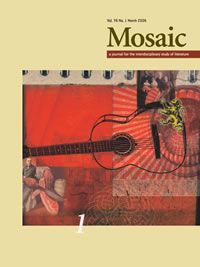Issue 39.1
Overview

General Issue
Published: March 2006
View the issue introduction or see the issue summary and contents below.
10 essays, totalling 192 pages
$16.95 CAD
The first Mosaic issue of 2006 opens with another interview in the "Crossings" series, this one with David Farrell Krell, Professor of Philosophy at DePaul University, a distinguished scholar of European thought, critic, translator, and writer of fiction and screen plays. Along with the interview, the issue includes an essay by David Krell on "Tenderness," published here for the first time. An additional eight essays complete the issue, studies of: Bernard-Marie Koltes's play, Sallinger; cognitive approaches to The Last Chronicle of Barset; the role of autobiography in rap lyrics; architectures of sacrifice in Ruskin and Bataille; Last Orders as a religious novel "gone underground;" the impact of the African-American musical tradition on contemporary Scottish women poets; symptoms/illness suffered by the Polish-Yiddish woman writer Esther Kreytman; and Freud's Interpretation of Dreams, read alongside Michelangelo's sonnets and Wittgenstein's Zettel.
Crossings: An interview with David Farrell KrellDawne McCance In March 2005, David Farrell Krell was the guest of the University of Manitoba as Distinguished Visiting Lecturer. The following interview was conducted on that occasion (17 March 2005). Mosaic is honoured to publish the interview here. | |
Tenderness: Aristotle - Hölderlin - Freud - Lacan – IrigaraDavid Farrell Krell Both Hölderlin and Freud entertain tenderness (die Zärtlichkeit) as a fundamental notion for religion and psychosexual development, respectively. Arguably, Aristotle’s word for friendship, φιλία, implies tenderness. Without it, life is tragedy. What about tenderness—la seule tendresse, as Irigaray says—in our time, the time of the rough beast? | |
Distant Resonances: Contemporary Scottish Women Poets and African-American MusicLaura Severin This essay focuses on the impact of the African-American musical tradition on contemporary Scottish women poets Liz Lochhead, Valerie Gillies, Jackie Kay, and Carol Ann Duffy, who draw on its stylistic and social features to include the feminine voice in Scottish poetry and to critique masculinist definitions of national identity. | |
From Bricks to Billboards: Hip-hop AutobiographyMickey Hess Current theory of autobiography illuminates life-writing as necessarily a kind of fiction. In applying this theory to hip-hop, I examine the unique role of autobiography in rap lyrics, and the narrative structures through which MCs link their careers as commercial recording artists to the criminality of the drug trade. | |
Lost in Space: American Characters as Creatures of a Culture/Dramaturgy of Abstraction in Koltès’s SallingerLes Essif Informed primarily by cultural discourse (especially Baudrillard, but also Saïd, Eagleton, and Kristeva) and dramaturgical theory (Brecht, Pavis, Ubersfeld), this essay discusses Bernard-Marie Koltès’s play Sallinger and the “dramaturgy of abstraction” it develops to represent the uncritical culture of abstraction that is America. | |
“Don’t You See I’m Burning?”: Comparing Thought to Fire in Freud, Michelangelo, and WittgensteinWilliam N. West This essay compares passages from Freud’s Interpretation of Dreams, Michelangelo’s sonnets, and Wittgenstein’s Zettel that include the image of a burning speaker, and suggests how to make sense of such uncanny repetitions between authors and texts. Comparative interpretation is justified less by theoretical understandings of psychoanalysis than by psychoanalytic practices. | |
Architectures of Sacrifice: Ruskin, Bataille, and the Resistance to UtilityJessica Maynard In The Accursed Share, Bataille explores an association between the squandering of resources (“sacrifice”) and a resistance to reification. In The Stones of Venice, Ruskin emphasizes the redemptive significance of Gothic ornament—human effort that is excess expenditure or, again, “sacrificial.” This essay investigates these links and possible lines of influence. | |
Diagnostics of a Writer: “The Case of Fraylin Esther S”Alicia Ramos-González In this essay, I focus on the supposed illness suffered by the Polish-Yiddish woman writer Esther Kreytman, analyzing how Kreytman’s illnesses have been interpreted by scholars, and reading some of Kreytman’s symptoms as the symptoms of a woman artist whose intellectual and literary aspirations turned her into a patient. | |
In the (Public) House of the Lord: Pub Ritual and Sacramental Presence in Last OrdersLewis MacLeod This essay argues that Last Orders can be read as a religious novel “gone underground,” that it demonstrates ways in which conventional religious feeling has been recontextualized and reconstituted in a largely secular contemporary context. While no one in Swift’s novel has a clear sense of religious faith, Swift’s pub rituals perform sacramental functions for his male characters. | |
Trollope’s The Last Chronicle of Barset: Memory, Depression, and Cognitive ScienceGordon Hirsch and Louella Hirsch This essay employs cognitive neuroscience to discuss The Last Chronicle of Barset. Josiah Crawley’s inability to remember how he obtained a cheque—a crux of the plot—is linked with his ruminative and depressed cognitive processing as depicted by Trollope. Other characters also face cognitive challenges, as do the book’s readers. |